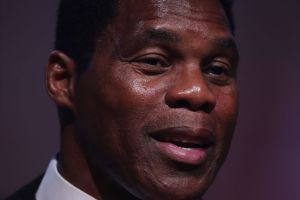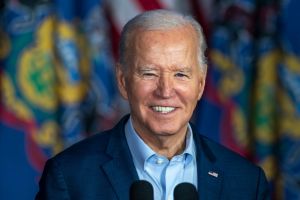J.D. Vance is the man Republicans have been praying for since the day Donald Trump stormed to the party’s presidential nomination five years ago. He has a lot of the traits conservatives liked about Trump: Vance, too, is a political outsider with proven appeal to an audience beyond politics, thanks to his bestselling memoir Hillbilly Elegy. Like Trump, Vance offers himself as an avatar for the people who have been discarded by globalization and demonized by a left-wing media and education establishment. And he is as radical as Trump — maybe more so — in his willingness to reject the merely liberal side of American conservatism. Trump defied elite orthodoxy on trade and immigration. Vance adds proposals to curb the tech companies and tax Ivy League endowments.
But if J.D. Vance is Trump-plus, he is the un-Trump as well: the kind of candidate longed for by Republicans who winced at Trump’s tweets and wanted someone equally tough but more self-restrained.
As a prospective candidate for next year’s Senate race in Ohio, Vance puts to the test the much-debated question of whether the positive side of Trump Republicanism can win elections, including the party’s own primaries, without the ex-president’s uniquely galvanizing personality.
That isn’t entirely fair to Vance, of course. He’s his own man — and he wrote Hillbilly Elegy well before Trump became president. If the struggles of Vance’s family and friends explained something about the 2016 election, it was only because they explained something about the overall plight of millions of Americans, then and now. Trump’s success was part of a larger story that Vance was one of the first to start telling.
Yet storytelling may be a pitfall for Vance as an office seeker. The very polish that makes him appealing to voters who found Trump too abrasive also makes his delivery rather dull. He looks and sounds like what he is today: a Yale Law graduate who made money as a venture capitalist and published a national bestseller.
He’s a US Marine, too — and his hardscrabble origins are the real thing. But when he talks about being an Appalachian kid who was once embarrassed in his law-school days to be asked whether he wanted the Chardonnay or the Sauvignon Blanc, he can’t help but sound like a David Brooks column somehow made flesh.
That’s unfair, too. Yet being authentic and sounding authentic are different things.
Not that Vance has so far made biography his main selling point. He’s running an issues campaign, or rather pre-campaign: he’s speaking at Lincoln Day events in the Buckeye State and keeping his profile high on Fox News and in the conservative thought world, but he is not yet officially declared as a candidate, as of press time. Peter Thiel is confident enough in Vance’s pre-candidacy, however, that he has already put $10 million into a Super PAC for his effort.
In May, Vance took part in a Washington conference on ‘woke capital’ sponsored by the Claremont Institute’s Center for the American Way of Life. I had spoken on a panel earlier in the day — and I was impressed by the spirit behind Vance’s words at the close of the event. This was no Chamber of Commerce conservative: ‘If you are fighting the American nation-state, if you are fighting the values and virtues that make this country great, the conservative movement should be about nothing if not reducing your power — and if necessary, destroying you.’
If anyone wondered what that might mean in practice, Vance was quite willing to get specific. ‘Harvard University’s $120 billion endowment is ammunition for our enemies — and we can’t let the enemy have that much ammunition or we’re going to lose,’ he said. ‘If you cannot go after the pocketbook of these people, if you cannot make them pay, then you are accepting defeat. It’s that simple.’ And tax-advantaged university endowments were not his only target: ‘We should eliminate all of the special privileges that exist for our nonprofit foundation class’ as a whole, he argued.
Vance’s language was no less fiery when it came to the ravages of globalization or the weaponization of human-resources bureaucracies to promote racism under the guise of critical race theory. He took the populist spirit that has animated the right over the past five years, and which has arguably only grown stronger since the 2020 election, and channeled that current into policy specifics and a heads-up display of the battlefield.
Yet something was nagging at me. I agreed with almost everything he said, and the words themselves were powerful — but they didn’t have much effect. The fire was in the language, not in the man.
Sincerity isn’t enough to sell a political agenda, especially if it’s a hard-edged one. You need the right persona to go with it. What Aristotle identified as pathos, the emotion of a speech, has to be matched by the ethos, the character type, of the rhetorician. A speech that sounds right coming from an old man sounds mawkish or absurd from a young one, for example.
Maybe Vance really is a firebrand, but he can’t play one convincingly. He’s too normal.
Then again, what doesn’t work well for the jaded political junkie might be what voters, including Republican voters, in fact want. One person I spoke to at the conference said he thought his wife would find Vance’s demeanor and tone reassuring, especially as a contrast to Trump. There are voters repulsed by the Democrats’ woke corporatism and inability to defend the rule of law in America’s cities who may agree with Vance but could never vote for Trump.
Vance himself told NPR in August 2016 that he was thinking of voting for the independent presidential candidate Evan McMullin because ‘I can’t stomach Trump. I think that he’s noxious and is leading the white working class to a very dark place.’ It’s a line that liberals looking to accuse Vance of opportunism never let him forget.
It may haunt him in next year’s Ohio Republican primary as well. But the GOP is full of politicians who changed their minds about Trump — and it’s not lacking in voters who have done so, too.
Vance can expect the primary to be brutal nevertheless. Several of Ohio’s leading Republicans view the retirement of Sen. Rob Portman as a golden opportunity to advance. Former state treasurer Josh Mandel has already made his campaign official, as has former state party chairwoman Jane Timken. By the middle of June, seven more candidates had declared their intent to seek the GOP nomination, while several others, including Vance, remained undeclared but serious prospects.
Mandel and Timken have both staked claims to be the true ‘America First’ or Trump Republican contender. Vance has a stronger intellectual pedigree as a national conservative — and a higher national profile as well. But just how many votes that buys in Ohio politics is an open question. And Donald Trump might choose to intervene directly to endorse one candidate as his personal brand-representative in the race.
J.D. Vance has a future no matter what happens with Portman’s Senate seat next year: he’s only 36. For now the Republican party remains the party of Donald Trump — who turned 75 this year and is likely to remain the GOP’s dominant figure at least through 2024. Even if Trump doesn’t run for the White House again, Democrats will campaign against him and his legacy. But one way or another, by the time Vance is Trump’s age, the Trump era will be 30 years in the past: about as far back as the Reagan era is now.
The ideological foundations of Reagan’s Republican party have proved to be remarkably sturdy. Those foundations were not just free market or quasi-libertarian: Reagan’s GOP was also the GOP of evangelical Christian activism and a panoply of grassroots organizations focused on social issues. Tax cuts, opposition to abortion, judicial originalism and a penchant for Mideast wars — that last an addition made by the Bush administrations — made for a peculiar but surprisingly stable mixture.
These are still the core commitments that most Republican officials and a great many of the party’s voters would affirm, with some hemming and hawing over the results of the past 20 years’ large-scale military interventions.
Yet the Reagan or Reagan-Bush formula began to lose its potency as it became clear to Republican voters, if not to officeholders, just how completely it had been subsumed under a 21st-century liberalism: a program of free trade, financialization, porous borders and cultural progressivism.
Trump didn’t scrap the old Reagan coalition’s commitments to cutting taxes, opposing abortion and appointing originalist judges, but he did begin to separate the GOP from consensus liberalism. Immigration restriction, trade skepticism and reluctance to get involved in new wars became planks in the unwritten manifesto of the Republican right, even if elected Republicans were slow to catch on.
Vance is aligned with Trump and the new spirit in the GOP on those issues. But he is also aligned with Republicans who have prioritized other new themes and issues, notably calls for regulation or the outright breakup of the biggest technology and social-media companies, and advocacy of what Vance characterized in a 2019 speech as ‘a family policy that [would make] it easier for American families to care for their children, to educate their children, to ensure that their children had access to high quality healthcare’.
These are priorities that have been voiced to one degree or another by several Republicans already in the Senate, including Josh Hawley of Missouri, Marco Rubio of Florida, Tom Cotton of Arkansas and even Utah’s Mitt Romney, who has proposed a scheme of federal payments for households with children. While among this cohort only Romney is avowedly anti-Trump, Cotton and Rubio are both more hawkish than Trump was, and Rubio has historically been weak on immigration.
Although Donald Trump’s personality overshadows the party, there are three overlapping clusters of ideas contending for the GOP’s long-term future: one is the Reagan package of commitments, more or less supplemented by adjustments in the direction of the other two sets of ideas. The second is the core Trump package of border control, economic nationalism and an America First foreign policy. And the third is what might be called the pro-government package, calling for federal support for children and strong measures against the tech companies.
The three packages can be mixed and matched, though some Reagan-package policies and pro-government policies make for awkward combinations. (Others, however, do not: there have always been abortion opponents who have argued in favor of more federal child support.)
In this light, Vance’s prospective Senate bid is interesting as more than just a test of Trumpism without Trump. And if Vance is sometimes too even-tempered for his own good as a candidate — which, outside of my own impressions, still remains to be seen — his eloquence is only an asset where program-molding is concerned. In his speeches to date, he has combined a Trump-like feel for manufacturing and industrial concerns with the hearthside interests and anti-tech-cartel focus of the post-Reagan Republicans in the Senate.
As someone whose youth and talent put him in a prime position to shape the Republican party well beyond the outcome of next year’s Ohio Senate contest, Vance should cast his eyes over the horizon even as he works to win his race. The remaking of the GOP is not just an intellectual exercise, but it’s about more than elections, too. It requires an honest confrontation with the kind of country we have, which in its economy, sociology and temperament is not what any conservative faction would like it to be.
The Reagan revolution largely succeeded, yet it failed to preserve anything like Reagan’s America. The post-Reagan right can only succeed, politically or otherwise, if it attempts not just to preserve or recover but to create. The American left has shown how profoundly a serious movement can transform the country. What J.D. Vance can accomplish, whether he wins next year or not, is to help build such a movement on the right.
This article was originally published in The Spectator’s July 2021 World edition.


















